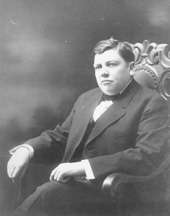Paul O. Husting
| Paul Oscar Husting | |
|---|---|
 | |
| United States Senator from Wisconsin | |
|
In office March 4, 1915 – October 21, 1917 | |
| Preceded by | Isaac Stephenson |
| Succeeded by | Irvine Lenroot |
| Personal details | |
| Born |
April 25, 1866 Fond du Lac, Wisconsin |
| Died |
October 21, 1917 (aged 51) Rush Lake, Wisconsin |
| Political party | Democratic |
Paul Oscar Adolph Husting (April 25, 1866 – October 21, 1917) was an American lawyer from Mayville, Wisconsin who served as a Democratic Party member of the United States Senate from 1915 to 1917.[1]
Background and early career
Husting was born April 25, 1866 in Fond du Lac, Wisconsin. His father, John P. Husting, had emigrated from the Grand Duchy of Luxemburg to the United States in 1855. His mother, Mary M. Rusting, née Juneau, was the fourth youngest of sixteen children born to Solomon Juneau, co-founder and first mayor of Milwaukee. Husting moved with his parents to Mayville, Wisconsin, in 1876, where he received a common school education. From the age of 17 years, he became successively a retail clerk in a general store, a railway postal clerk, a mailing clerk in the Wisconsin State Prison at Waupun, and assistant bookkeeper in the office of the Secretary of State of Wisconsin under Thomas J. Cunningham (also a Democrat).
Husting entered the University of Wisconsin Law School, passed the state bar examination, and was admitted to the bar in 1895. He initially practiced law in Mayville by himself, but in 1897 associated himself with C. W. Lamoreux until the latter was elected judge, upon which the firm of Husting & Brother was formed.
Public office
Husting was elected district attorney of Dodge County in 1902 and reelected in 1904. He was elected to the state senate in 1906, and reelected in 1910. In the state senate, he advocated conservation of the state's natural resources, the income tax, the "Husting bill" establishing a maximum passenger railroad fare of two cents per mile, initiative and referendum, and direct election of United States senators. He offered the original resolution to investigate, and assisted in the investigation of, the Wisconsin primary and election of 1908, which resulted in the enactment of the state's Corrupt Practices Act. Husting was the first United States senator from Wisconsin to be elected by a direct vote of the people, defeating ex-Governor Francis E. McGovern at the November, 1914, election by 967 votes. He succeeded Isaac Stephenson as United States senator on March 4, 1915, and served in the Senate from 1915 until his death.[2] He was chairman of the Committee on Fisheries during 1917 and chairman of a special committee investigating trespasses on Indian lands during his entire time in the Senate.
Death and political consequences
Husting was killed in a duck hunting accident on Rush Lake near Pickett, Wisconsin while rising in a row boat after telling his brother Gustave to fire. Gustave shot his brother accidentally in the back. Husting fell into a coma and died later in the day. The New York Times described him as "the most aggressive leader" of the "loyalist" (i.e., supportive of Woodrow Wilson's pro-Allied policies) forces in Wisconsin, and contrasted him with "Senator La Follette and the pro-German constituency behind him".[3] He is interred at the Graceland Cemetery in Mayville.
Husting's death was of political importance. In 1919 the Senate would have been under Democratic control had he not been succeeded by Republican Irvine Lenroot, as a consequence of which in 1919 the Senate had 49 Republicans and 47 Democrats (Vice-President Thomas R. Marshall was a Democrat, and had the power to break all ties).
References
- United States Congress. "Paul O. Husting (id: H001006)". Biographical Directory of the United States Congress.
| United States Senate | ||
|---|---|---|
| Preceded by Isaac Stephenson |
Class 3 U.S. Senator from Wisconsin 1915–1917 |
Succeeded by Irvine Lenroot |
